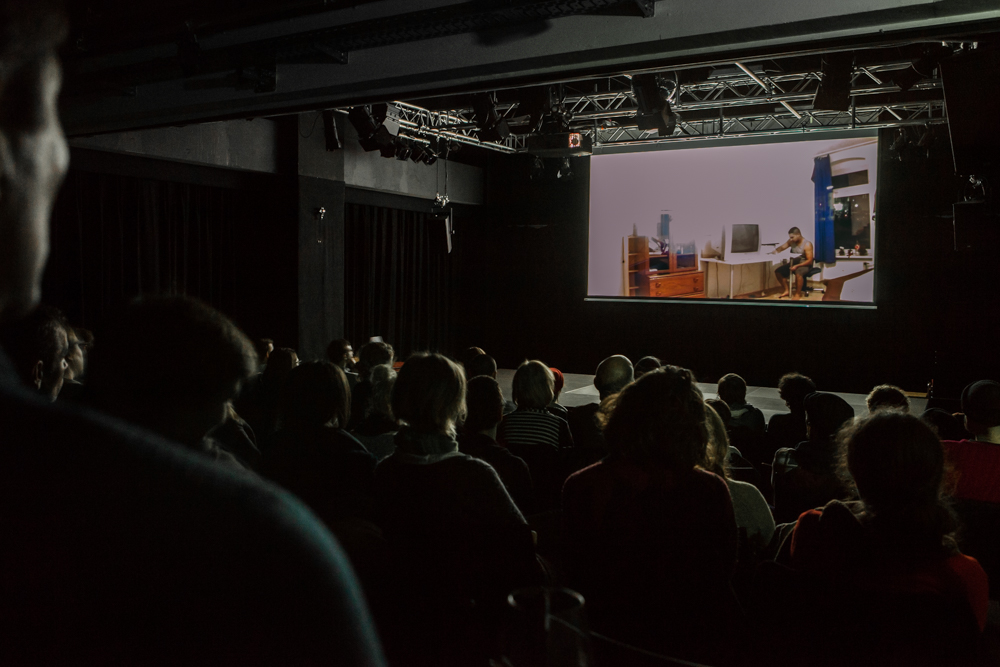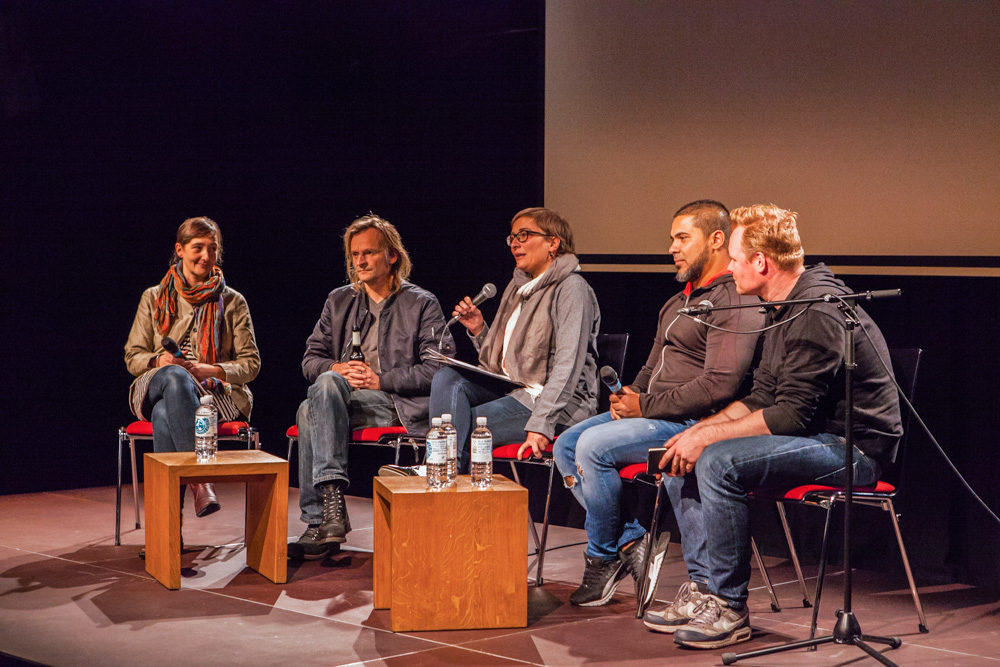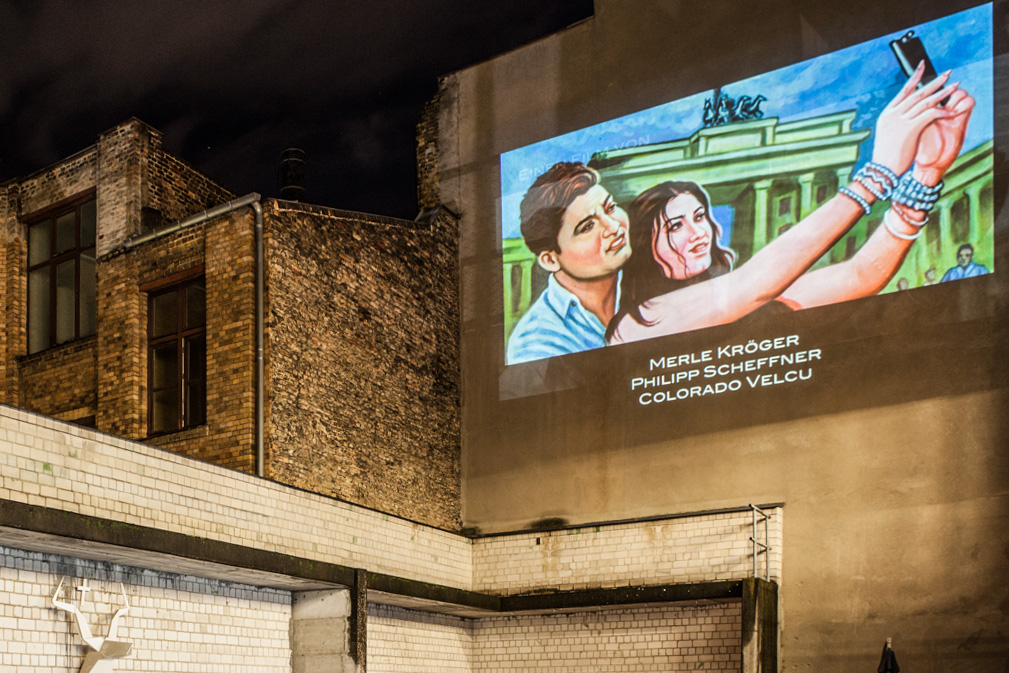The story begins in a grain field. It’s 1992, and there are two dead Romanians lying on the border between Germany and Poland. The field behind them is in flames. When Philip Scheffner hears about those events for the first time, he’s busy with other projects. But he can’t get the image of the burning field out of his head. One of the two men who died there in an alleged hunting accident is named Grigore Velcu. Nearly twenty years after his death, Philip Scheffner is sitting with Velcu’s son Colorado in a living room in Faţa Luncii, Romania.
“I was really skeptical,” says Velcu today about their first meeting. He now lives in Berlin and often stops in at Scheffner’s Kreuzberg studio. But back then, in the summer of 2010, he says, “There were all these strange people in our living room – cameraman, director, a driver. And after all that time they wanted to hear about my father’s death.” Why? “If I’d gotten the feeling Philip wasn’t listening to me at that moment, I would have stopped everything immediately.” But Scheffner manages to explain to Velcu how much he cares about the project. That he’s interested in his father’s case because the German authorities barely paid it any notice many years ago. That he wants to know what happened to the families of the victims, who were not even contacted at the time. And that at least things that were hushed up would come to the public’s attention via a film. “I thought that was okay,” says Velcu curtly.

In one of the first scenes of Revision (2012), Scheffner’s film about Velcu’s father, Colorado Velcu is sitting on the sofa with his mother and a brother – they’re talking about his family. After a few sentences he interrupts. “I think we should do each of the shots individually, then we can talk more freely,” he says. It’s the first day of shooting and Scheffner already knows who he’s dealing with: a man who knows exactly what he wants and who understands the medium of film.
What follows in the coming weeks is an arduous process. Both sides have major prejudices. And for the Velcu family it’s a painful reprocessing of the past. After lengthy research, they grasp that they weren’t included in any of the investigations, that witnesses who were in that field with Velcu’s father were never interviewed, that the shooters were finally acquitted under questionable circumstances. They grasp the indifference felt towards Roma like them.
But it’s something completely different that finally creates a bond. At some point, Scheffner finds out that the Velcus are enthusiastic cineastes who have something in common with him: a love of Bollywood. From then on, mainly Scheffner and Colorado Velcu talk shop about good and bad actors, exchange DVDs and watch movies together.
“This looks like a Bollywood movie,” a teenage voice says from the back seat of a car. It’s 2014 and the Velcus are driving from Essen to Berlin past yellow rapeseed fields and quaint small towns. Again, Scheffner is present and filming. After Revision was finished and screened at the Berlinale with everyone involved, Velcu has remained in contact with Scheffner. When he no longer sees any prospects in Romania for himself and his seven children, the filmmaker helps him organize their move to Germany.

Scheffner documents the arrival of Velcu, his two sisters and their families: how they first live in provisional, barely habitable accommodations in Essen until they finally come to Berlin. “Somehow it was easier for all of us when the camera was in the room,” says Scheffner. “Maybe because we got to know each other through filming. I think otherwise the families wouldn’t have really known what to do with me. Invite me to dinner, ask me to stay over?”
In Berlin, Scheffner gives Velcu’s eldest daughter a camera so she can keep a digital diary. The initial footage surprises him. It’s not just Noami filming herself, her brothers, cousins, aunts and uncle. Everyone in the family seems to pick up the camera – especially Colorado Velcu. The material impresses Scheffner, so he and Velcu make a plan. Together they want to make a film about the family’s first phase in Berlin. The Velcus will do most of the filming, but Scheffner will keep shooting material as well. The RBB, the Berlin-Brandenburg Broadcasting, gets involved; cameras are provided and distributed to everyone. It’s a big adventure.
After just a few months, however, Velcu’s sisters and their families move on to Spain. It was more difficult in Germany than they expected. They want to try working as harvest hands. Their brother stays behind with seven children and suddenly has to overcome bureaucratic hurdles and financial worries on his own. The intimate moments of the film are when he comes home from the construction site at half past five in the evening, opens letters from the child benefit agency, and says that his wages won’t arrive in time. When he sits at the kitchen table, thinking about how he’s going to manage without child benefits, school places and with only 150 euros that they have been living on for weeks.
Scheffner often doesn’t hear about these crises until weeks later. Once or twice a month, the two meet to view the footage. They sit together in front of the screen and watch scenes, some of which Scheffner is seeing for the first time. He also often hears about the family’s existential distress on a time lag. As a documentary filmmaker, he has a responsibility for his protagonists. But Velcu doesn’t easily accept help, monetary support especially is out of the question, Scheffner says. His independence is important to Velcu, both in real life and in filmmaking. Again and again this is being demonstrated in their collaboration. “It was exciting to see how differently we reacted to some scenes, and what we hadn’t heard about each other in the meantime,” says Scheffner. In long conversations, they decide which episodes should be used in the final cut.
The result is the film And-Ek Ghes…, which, despite everything, does not emphasize its protagonists’ existential distress. It’s a film that shows the intimate normality of everyday family life. We get close to this family when Velcu scolds his children and then can’t control his laughter because the scene is staged. When he rolls his eyes, annoyed because no one cleaned up the apartment. When he turns up the car radio and sings once the child benefits finally arrive. When his fun with self-staging becomes obvious and the camera itself seems like a member of the family. Although Velcu and Scheffner no longer use it to bridge the gap in their unusual relationship. After two films, they no longer need the camera.
Translation: Faith Ann Gibson
